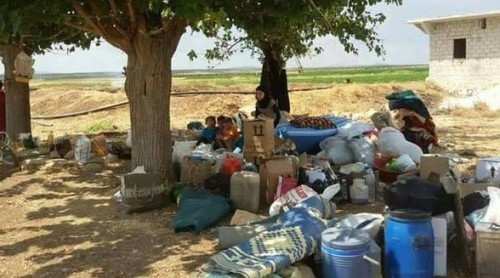PHOTO: Civilians living in open air on farmland in northern Aleppo Province
While the world debates what to do about the refugee crisis — to little effect so far, both inside and outside Syria — activist Khaled al-Khatib tells Syria Direct of one of the latest displacements of civilians.
In northern Aleppo Province, residents are fleeing the frontline between rebels and the Islamic State, especially around the town of Mare’.
The Islamic State stepped up attacks on Mare’ this summer, in the latest phase of a conflict that began in January 2014. An estimated 90% of the town’s population fled, but they have found the Turkish border — 19 km (12 miles) away — closed because camps in Turkey are filled to capacity. They do not even have the support of aid agencies, who are not able to operate in northern Aleppo.
Q: What happened in Marea, and why are the people of the area fleeing? Do you have any estimates of the number of displaced?
For about two months, the Islamic State has been trying to advance and take several villages around Marea, shelling these areas with different types ammunition, including chemical rounds. At the beginning of the month, IS got very close to the city of Marea and hit it with a barrage of rockets containing mustard gas, which is banned internationally.
This was the most violent attack on the city by IS so far, and led to approximately 50,000 people fleeing from their homes, or about 90 percent of the city’s population. They were afraid IS was going to take revenge on the city because, since the beginning of the conflict, it has been active in the revolution: Every family has a fighter with the FSA [Free Syrian Army]. I want to point out that the city has been hit by five suicide attacks in the last month, which killed at least 50 people.
Q: Where have residents fled to, and what are the conditions like there?
Half of the displaced are poor and can’t afford the rent of a house, so they put down mattresses in the orchards west of Mare’ and sleep there. The other half are spread out among [several nearby towns] where they are renting houses. There are others who went to the Akada and Salama camps at the border, but they are still sleeping outside because of the overcrowding at the camps.
The situation is tragic for all the displaced, because most of them left their houses with only the clothes on their backs, they didn’t bring anything with them since the most violent attack on the city [on September 1] happened at two in the morning.
Those who are sleeping outside in the orchards, their state of affairs is very sad. Some get shade among the trees and others from blankets they made into tents since there aren’t regular tents. Food is very limited, with only vegetables available in the neighboring villages. Food aid is practically non-existent. A campaign was started to gather donations and food for these families, but we haven’t received anything yet.
The situation isn’t better for those who went to the border camps near Akada and Salama camps; the camps can’t absorb more displaced families.
As for the families who went to the nearby towns and villages, their situation is a bit better. The local councils in these towns distributed mattresses and blankets to them, and made a gesture of food baskets with cans of beans, chickpeas, oil, and bulgur, but it is not enough and won’t meet the needs of all the displaced.

